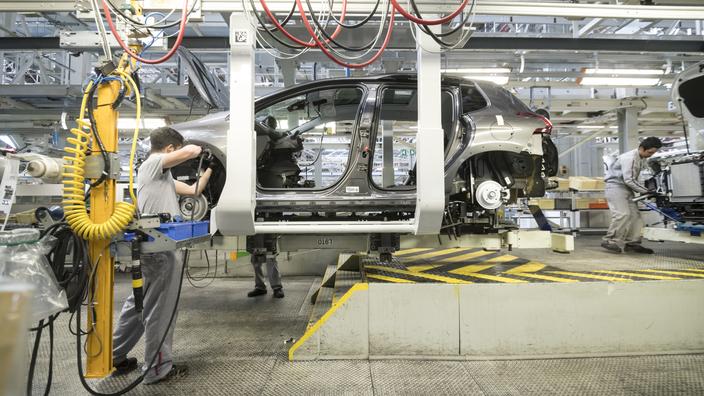Can the French automobile industry go up the slope?
In a working document published on Wednesday, France Stratégie looks back at the causes that have pushed manufacturers to leave France since the mid-2000s. The think tank attached to Matignon but which emphasizes being "
autonomous
" also notes the benefits recent tax cuts weighing on production, a glimmer of hope for the future of the French sector.
Read alsoSemi-conductor shortage is hurting the global automotive industry
Based on the production and sale of 156 million cars in the world, between 2017 and 2018, the author draws up a gloomy basic observation: in decline for the past fifteen years, the French automotive sector has suffered a "
sharp decline in production and employment,
" recalls Aymeric Lachaux. The number of vehicles produced collapsed by 33% between 2000 and 2018, and the trade balance, exceeding 10 billion euros between 2000 and 2005, became in deficit from 2008. It has continued to widen. since. In 2016, the Hexagon only manufactured 6.7% of vehicles produced in the European Union, against nearly double - 13.1% - in 2000. Employment also suffered from this loss of speed: "
the number of people employed has been halved since 2000
”.
The causes of this collapse are known: France suffers from excessively high production costs but also from non-cost factors, such as quality, level of range, innovation, brand image, "
insufficient
" and finally overwhelming taxation.
What to discourage economic actors. "
The cost of labor as well as the taxation on production and companies explain almost the entire lack of attractiveness of France vis-à-vis the United Kingdom, Spain and the Czech Republic
", summarizes , without appeal, the document. Wages in the French industry are higher than elsewhere in Europe, as is the hourly cost of labor.
Production taxes and those on profits are also higher in France than across the Rhine, the study notes. So many elements that work against the country, compared to Germany, Spain, the United Kingdom, Japan or the United States. The damaged French industrial fabric does not allow industrialists to achieve as many economies of scale as elsewhere, reinforcing the French backwardness.
This graph shows the attractiveness and its determinants for the ten most competitive economies for automobile production.
This attractiveness is “pure” because it does not take into account the proximity of companies and markets other than through their effect on costs via economies of scale.
The contribution of each factor is based on the coefficients of the estimation of the determinants of the attractiveness of the countries and the corresponding variables for the year 2018. The result is then subtracted from the value corresponding to France.
Screenshot of the France Strategy report
Hope for years to come
So far is the French automobile industry doomed? Maybe not: the note from France Stratégie draws up an optimistic assessment of the reforms. Recent or announced measures, aimed at strengthening the competitiveness of companies, "
could have a strong positive impact on the production (+ 20%) of the automotive sector in France,
" says the document. By reducing taxes, the executive has made the country more attractive. The corporate tax rate must therefore fall to 25% in 2022, and production taxes must in turn fall. Developments that could divide the trade deficit of the automotive sector "
by three
", calculates the think tank, while increasing the number of vehicles produced. Money therefore remains the sinews of war.
One downside, however: this analysis does not take into account the development of the electric vehicle and the accelerated transition from thermal to electric. But, so far, “
the location of electric vehicle assembly plants appears […] largely governed by the same determinants in terms of the attractiveness of the territories and the competitiveness of businesses
”, qualifies the document. The gains obtained by lowering taxes and production costs should therefore also have a positive influence on the location of activities linked to the electric car.







